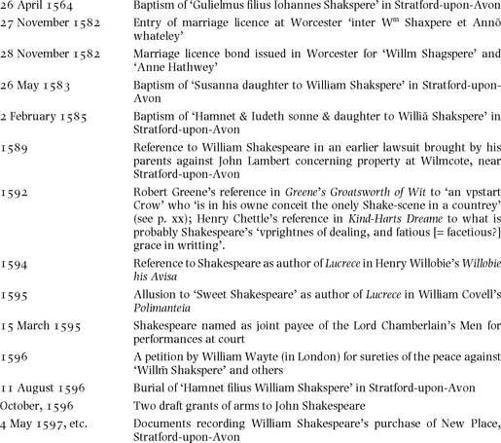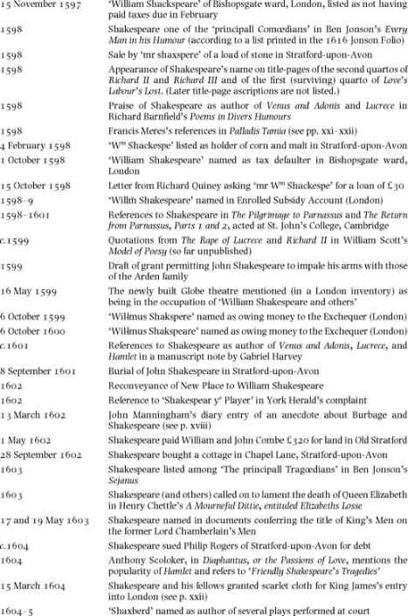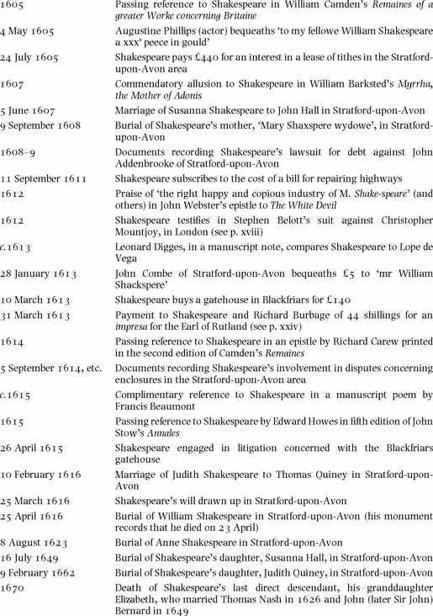REGAN
Our sister’s man is certainly miscarried.
EDMOND
‘Tis to be doubted, madam.
REGAN
Now, sweet lord, You know the goodness I intend upon you.
If we were to read in the modern meaning of doubt, it would suggest that Edmond is disagreeing with Regan - but as the context suggests this is not the case, we need a different meaning of doubt - ‘fear’.
Finally, as with grammar, we must be prepared to see the demands of metre altering word forms. The choice between vantage and advantage, scape and escape, shrew and beshrew and many other such alternatives can be solely due to the location of the word in the line. Sometimes we can even see the alternative forms juxtaposed, as when both oft and often appear in Julius Caesar (3.1.115-19):
BRUTUS
How many times shall Caesar bleed in sport,
That now on Pompey’s basis lies along,
No worthier than the dust!
CASSIUS
So oft as that shall be,
So often shall the knot of us be called
The men that gave their country liberty.
Names can be altered too. At one point in Pericles, narrator Gower refers to Pericles’ counsellor with his full name:
In Helicanus may you well descry
A figure of truth.
(22.114-15)
At another, he shortens it:
Good Helicane that stayed at home,
Not to eat honey like a drone.
(5.17-18)
Such metrically induced alternations rarely have any semantic or pragmatic consequence.
The examples in this essay show that in order to develop our understanding of Shakespeare’s use of language we need to work through a three-stage process:
• we first notice a linguistic feature - something which strikes us as particularly interesting, effective, unusual, or problematic (often because it differs from what we would expect in Modern English);
• we then have to describe the feature, in order to talk about it and to classify it as a feature of a particular type; the more precisely we are able to do this, by developing an awarenesss of phonetic, grammatical, and other terminology, the more we will be able to reach clear and statable conclusions;
• we have to explain why the feature is there.
It is the last stage which is the most important, and which is still surprisingly neglected. It is never enough, as has often happened in approaches to Shakespeare’s language, simply to identify and describe an interesting feature - such as a particular metrical pattern, piece of alliteration, word order, or literary allusion - and proceed no further. We must also try to explain its role - its meaning and effect - in the context in which it appears, and that is why this essay has paid so much attention to seeing his language within a semantic and pragmatic perspective.
It is, of course, by no means the whole story. Language in turn must be placed within a wider literary, dramatic, historical, psychological, and social frame of reference. We must also expect there to be many occasions when meaning and effect cannot be precisely determined. There will always be a range of interpretive possibilities in the language that offer the individual reader, actor, director, or playgoer a personal choice. But the linguistic stage in our study of Shakespeare should never be minimized or neglected, for it is an essential step in increasing our insight into his dramatic and poetic artistry.
CONTEMPORARY ALLUSIONS TO SHAKESPEARE
MANY contemporary documents, some manuscript, some printed, refer directly to Shakespeare and to members of his family. The following list (which is not exhaustive) briefly indicates the nature of the principal allusions to him and to his closest relatives. It does not include publication records of his plays (given in the Textual Companion), the appearances of his name on title-pages, unascribed allusions to his works, commendatory poems, epistles, and dedications printed elsewhere in the edition, or records of performances except for that of 1604-5, in which Shakespeare is named. The principal documents are discussed, and most of them reproduced, in S. Schoenbaum’s William Shakespeare: A Documentary Life (1975).



COMMENDATORY POEMS AND PREFACES (1599-1640)
Ad Gulielmum Shakespeare
Honey-tongued Shakespeare, when I saw thine issue
I swore Apollo got them, and none other,
Their rosy-tainted features clothed in tissue,
Some heaven-born goddess said to be their mother.
Rose-cheeked Adonis with his amber tresses,
Fair fire-hot Venus charming him to love her,
Chaste Lucretia virgin-like her dresses,
Proud lust-stung Tarquin seeking still to prove her,
Romeo, Richard, more whose names I know not—
Their sugared tongues and power-attractive beauty
Say they are saints although that saints they show not,
For thousands vows to them subjective duty.
They burn in love, thy children; Shakespeare het them;
Go, woo thy muse more nymphish brood beget them.
John Weever, Epigrams (1599)
A never writer to an ever reader: news
Eternal reader, you have here a new play never staled with the stage, never clapper-clawed with the palms of the vulgar, and yet passing full of the palm comical, for it is a birth of that brain that never undertook anything comical vainly; and were but the vain names of comedies changed for the titles of commodities, or of plays for pleas, you should see all those grand censors that now style them such vanities flock to them for the main grace of their gravities, especially this author’s comedies, that are so framed to the life that they serve for the most common commentaries of all the actions of our lives, showing such a dexterity and power of wit that the most displeased with plays are pleased with his comedies, and all such dull and heavy-witted worldlings as were never capable of the wit of a comedy, coming by report of them to his representations, have found that wit there that they never found in themselves, and have parted better witted than they came, feeling an edge of wit set upon them more than ever they dreamed they had brain to grind it on. So much and such savoured salt of wit is in his comedies that they seem, for their height of pleasure, to be born in that sea that brought forth Venus. Amongst all there is none more witty than this, and had I time I would comment upon it, though I know it needs not for so much as will make you think your testern well bestowed, but for so much worth as even poor I know to be stuffed in it. It deserves such a labour as well as the best comedy in Terence or Plautus. And believe this, that when he is gone and his comedies out of sale, you will scramble for them, and set up a new English Inquisition. Take this for a warning, and at the peril of your pleasure’s loss and judgement’s, refuse not, nor like this the less for not being sullied with the smoky breath of the multitude; but thank fortune for the scape it hath made amongst you, since by the grand possessors’ wills I believe you should have prayed for them rather than been prayed. And so I leave all such to be prayed for, for the states of their wits’ healths, that will not praise it.